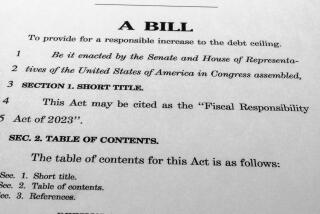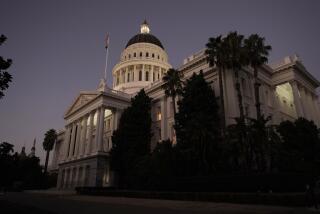The House
- Share via
To Pass S & L Bill
By a vote of 201 to 175, the House sent to President Bush legislation (HR 1278) designed to bail the thrift industry and the federal government out of the financial calamity caused by thecollapse of hundreds of savings and loans in the 1980s. The Senate had passed the bill on a non-record vote.
The first phase of the S & L salvage will be for the government to borrow $50 billion primarily for closing or merging troubled thrifts and meeting federal reimbursement obligations to those who lost billions in U. S.-insured deposits. About $20 billion will be incurred by Treasury borrowing and included in the fiscal 1989 budget. The remaining $30 billion will be borrowed by a new government-chartered corporation but will not be counted on the budget nor tallied as part of the federal debt.
Although the thrift industry will have to repay the $50 billion principal, taxpayers will be required to pay borrowing costs. Conservative estimates are that the total bailout will cost at least $160 billion, including debt service over 30 years, with the average taxpayer supplying $1,000 of the amount. Other estimates double those projected costs.
Supporter Chalmers Wylie (R-Ohio) said: “We are not bailing out S & Ls. We are not bailing out their stockholders or their managers. We are delivering on our promise that the federal government stands behind the safety and the life savings of millions of Americans.”
Opponent Sam Gibbons (D-Fla.) said the rescue “should have been paid for by taxes, current taxes, a very small tax, but the President could not bring himself to say the word. So we have foisted on our children and grandchildren an unconscionable debt of perhaps $100 to $200 billion.”
Members voting yes supported the bill.
How They Voted Yea Nay No vote Rep. Beilenson (D) x Rep. Berman (D) x Rep. Gallegly (R) x Rep. Moorhead (R) x Rep. Waxman (D) x
Violence, TV and Antitrust
By a vote of 399 to 18, the House sent to the Senate a bill (HR 1391) providing an antitrust exemption to enable competing television industry executives to meet to discuss ways of making their programs less violent.
Sponsor Jack Brooks (D-Tex.) said the bill would “remove the perception, apparently held by many in the television industry, that the antitrust laws are a possible impediment” to less-violent programming.
Opponent Don Edwards D-San Jose) said: “I have never seen an exemption to the antitrust laws that worked for the benefit of the American people.”
Members voting yes supported the antitrust exemption.
How They Voted Yea Nay No vote Rep. Beilenson (D) x Rep. Berman (D) x Rep. Gallegly (R) x Rep. Moorhead (R) x Rep. Waxman (D) x
More to Read
Get the L.A. Times Politics newsletter
Deeply reported insights into legislation, politics and policy from Sacramento, Washington and beyond. In your inbox three times per week.
You may occasionally receive promotional content from the Los Angeles Times.










